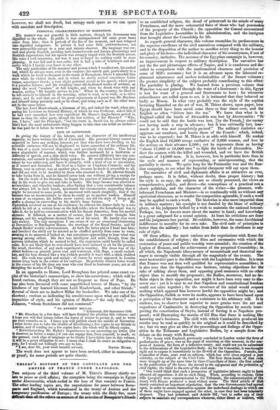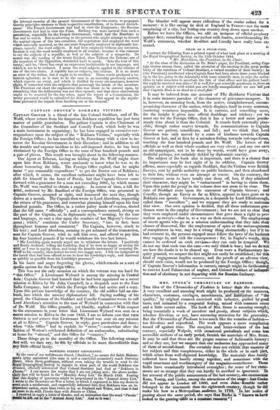SHIERS ' S HISTORY OF THE CONSULATE AND THE EMPIRE OP FRANCE
UNDER NAPOLEON.
Tun subjects of the third volume of M. Thiers's History chiefly re- late to peace or civil affairs; the exception being the campaign in Egypt under Abercrombie, which ended in the loss of that country to France. The other leading topics are, the negotiations for peace between Bona- parte and England, which terminated in the treaty of Amiens and the temporary pacification of Europe ; the treaty with the Holy See, more difficult than all the others on account of the aversion of Bonaparte's friends
to an established religion, the dread' of priesteraft in the minds of many Frenchmen, and the more substantial fears of those who had possession of the property of the Church ; the opposition the Consul encountered from the Legislative Assemblies in his administration, and the intrigues that brought about the Consulship for life.
As regards general character, this volume resembles its predecessors in. the superior excellence of the civil narratives compared with the 'military, and in the disposition of the author to sacrifice every thing to the honour and glory of his hero—the individual character of his countrymen, if not of his country, inclusive. The 'account of the Egyptian campaign is, however, an improvement in respect to military description. The narrative has not the fire and picturesque effects of Napier, and it is cumbrous and de-' tailed in comparison with the mathematical clearness and precision of some of Mill's accounts; but it is an advance upon the laboured re- gimental minuteness and useless technicalities of the former volumes the greater simplicity of the subject probably contributing to this effect.' The partiality is glaring. We learned from a previous volume that Waterloo was not gained through the want of a lieutenant : in this, Egypt is lost for want of a general and lieutenants to boot ; for whenever' subordinates are called upon to act, it is intimated that they behaved as badly as Menou. In what very probably was the style of the sophist lecturing Hannibal on the art of war, M. Tillers shows upon paper, how Egypt should have been saved some three or four times over, and the English as often "driven into the sea." We learn that what is in England called the battle of Aleiandria was lost by Abereronibie: "It' could not be said that the battle was lost, Pry the French,) the-enemy, not having made a step in advance ; but it was 'virtually lost, inas- much as it was not completely gained." The military statistics ex-' aggerate our numbers, and lessen those of the French : which, indeed,' was to be expected ; but M. Thiers is at odds with himself. He makes, the English land 16,000 troops exclusive of 2,000 seamen, and lose in, the actions on their advance 2,500 ; yet he represents them as having' "about 17,000 or 18,000 men " to fight the battle of Alexandria. De- duct the seamen with the killed and wounded, and we have the British estimate of 14,000 men. It is, however, less in particular facts than in the style and manner of representing, or misrepresenting, that the partiality is shown. We quite long for the Peninsular war and the MS sign campaign, to see what the Imperial clacqueur will say upon them. The narrative of' civil and diplomatic affairs is as attractive as ever perhaps more. It is fuller, without doubt, than proper history ; but the style is so easy, the subjects are so clearly presented, the views at comprehensive, politic, and direct—the conceptions of a practical not te closet politician, and the 'character of the writer—the pleasant, well- informed Frenchman and Minister—is so continually with us without any egotistical obtrusion, as to render the composition agreeable, if such a word may be applied to such a work. The historian is also more impartial than in military matters ; his eyesight is not dazzled by the blaze of military. glOry, or his judgment bribed by a wish to maintain the national honour. Perhaps, too, be bums more about the matter in hand; and knowledge is a great safeguard for a sound opinion. At least his criticisms are freer and his judgments less partial. He exhibits, however, the same Jacobinical indifference to morality for its awn sake. The civil code of principles is better than the military but rather from habit thaw in obedience to any rule of right. Of -these all the limit curious are the negotiations with Rome for the establishment of religion ; the fhtes and ceremonies with whick thg restoration of peace and public worship were attended ; the creation of the Legion of Honour, and the achievement of the perpetual Consulship ; in. all which, the Napoleonic idiosyncracy of mountebank and theatrical ma. nager is strongly visible through all the magnitude of the events. The most instructive part is the difference with the Legislative Bodies. his.rne that France was not then well qualified for representative assemblies; it is also true that the Opposition was factious, raising objections for the sake of talking about them, and opposing good measures with no other object than to mortify the proposers • the Bodies, moreover, had no de- finite object in their opposition, nor might it have been very easy to dis- cover one : yet it is easy to see that:Napoleon and constitutional freedom could not exist together ; for .the structure of his mind would respect nothing which opposed him however lawful the opposition might be ; and the Opposition, foolish as were its modes, appears to have been based upon a perception of his character and a resistance to his arbitrary will. It is curious, too, to observe how superior to mere genius were the art and experience of Cambathes in destroying the Opposition by merely inter- preting the constitution of Sieyes, instead of forcing it as Napoleon pro- posed; well illustrating the maxim of Gil Bias that there is nothing like knowing one's business. The skill with which Cambacires produced his results may be read as quickly in the original as it could be described by. us ; but we may give an idea of the proceedings and feelings of the Oppo- sition in the Tribunate and Legislative Bodies, by a sample from the debate on the treaty with Russia. " The treaty with England, previously concluded in London under the form of preliminaries of peace,.was on the point of receiving at this moment, in the con, greys of Amiens, the form of a definitive treaty, and could not yet be submitted to the deliberations of the Legislative Body. As for the Concordat, it was thought right not to expose it immediately to the ill-will of the Opposition. Portalis, the Councillor of State, nest read an address, which has ever. since enjoyed a just celebrity, on the subject of the Civil Code. The first three beads of that code were brought up at the same time by three Councillors of State: the first related to the .publiattion of the taws; • the second to the enjoyment and the privation of civil rights; the third to the acts of the civil state. " One would think that such a prospectus of legislative labours ought to have silenced all opposition: it did no such thing. When, according to custom, those bills (projets) were communicated to the Tribunate, the communication of the treaty with Russia produced a most violent scene. The third article of that treaty contained an important stipulation, that the two Governments bad agreed upm, in order to secure themselves against the underhand dealings in which one of them might have engaged against the other, in case they had been inimically disposed. They had promised, said Article III., 'not to suffer any of their subjects to maintain any correspondence whatever, either direct or indirect, with the internal enemies of the present Government of the two states, to propagate therein principles ebntrary to their respective constitutions,- or to foment disturb- ances.' The French Government had- had in vievrthe Emigrants; the Russian Government had had in view the Poles. Nothing was more natural than such a Fe.uttion; especially fat the French. Government, 'which lead' the Bourbons to fear and to watch. But in adverting to the persons who might attempt to disturb the mutual repose of the two countries, thd negotiators had employed the word which naturally occurred, as the one most frequently employed in diplomatic lan- guage, namely, the word subjects.. It had been employed without any intention, because it was the word usually employed in all treaties; because it was common to say the subjects of a republic, as well as the subjects of a monarchy. No sooner was the reading of the treaty finished, than Thibaut the Tribune, one of the members of the Opposition, demanded leave to speak. Into the text of this treaty, said he, there has crept an expression inadmissible in our language, and which is not to be endured. I mean the word subjects, applied to the citizens of one of the two states. A republic has no subjects, but citizens. It is no doubt an error of the writer, but it ought to be rectified: These words produced a ve- hement agitation; as is sure to be the case in an assembly previously excited, which expects an event, and which is thrilled by every circumstance, however alight if connected with the subjects that preoccupy the minds of the members. The President out short the explanation that was about to be entered upon, by remarking that the deliberation was not then opened; and that these observations ought to be reserved for the day when, upon the report of a Commission, the treaty presented would be submitted for discussion. This appeal to the regale- tions prevented the tumult from breaking out at the moment."



























 Previous page
Previous page